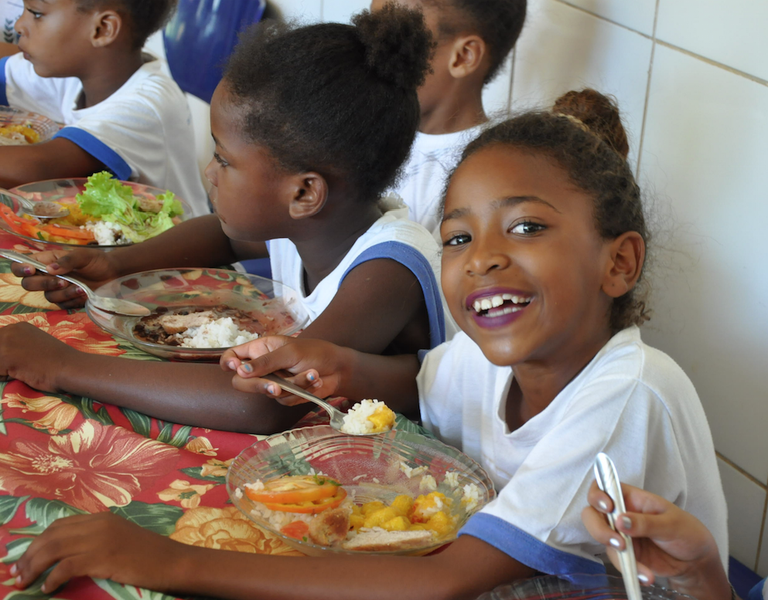During the year 2023, the National Fund for Education Development (FNDE) made significant investments in the field of school feeding, marking the first year of the new government of Luiz Inacio Lula da Silva. Below are the most noteworthy achievements regarding the nutrition of students in public schools in Brazil.
Adjustment of PNAE: One of the most significant developments was that, after six years without adjustments, the per capita values of the National School Feeding Programme (PNAE) increased by levels ranging from 28% to 39%, through Resolution CD/FNDE No. 2/2023, dated March 10, 2023.
Management Committee: Through Ordinance No. 219, dated April 26, 2023, another advancement in the field was achieved: the reinstatement of the Management Committee and the Advisory Group in the scope of Family Farming of PNAE, aiming to discuss the main challenges for the implementation of family farming in the program and propose solutions.

Training/Capacitation: Throughout the year, FNDE held 31 training meetings for School Nutrition Councilors, both virtually and in-person, with a state-level reach and in collaboration with the Collaborating Centers for School Nutrition and Nutrition (CECANEs). Additionally, five regional technical meetings for Pnae nutritionists and the IV National Meeting of Pnae for the Federal Network were conducted.
FNE Journey: In 2023, the 5th edition of the Journey of Food and Nutritional Education (FNE) was launched, a project aimed at promoting the discussion and practice of FNE actions in the school environment and highlighting activities already carried out in public schools across the country. Additionally, linked to the Journey, the book “Best Stories from the FNE Journey – 4th edition” was launched, along with the course on food and nutritional education in schools, titled “School Feeding as an Educational Strategy for a Healthy Life,” for 450 participants.
Peoples and Traditional Communities: A Technical Note from PNAE emphasized the need to simplify procedures for including family farmers from Peoples and Traditional Communities (PCTs). In accordance with Decree No. 6,040/2007, the document guides Program Executing Entities to accept the Social Identification Number (NIS) from CadÚnico, so that this public can participate in Pnae public calls if they do not have access to the Declaration of Aptitude for Pronaf (DAP) or the National Family Farm Registry (CAF). This initiative was inspired by the Food Acquisition Program (PAA), which started accepting NIS registration in June 2023.
Interministerial Partnership: FNDE was not alone in its victories in the school feeding. During the last year, a Technical Cooperation Agreement was celebrated between the agency and the Ministries of Education (MEC), Social Development and Assistance, Family and Hunger Combat (MDS), Agrarian Development and Family Farming (MDA), and Health (MS). The document aims to strengthen existing actions and implement new measures to ensure healthy and adequate nutrition in the school environment, contributing to the food and nutritional security of students and the development of family farming.
Adequate and Healthy Nutrition in the School Environment: Decree No. 11,821, dated December 12, 2023, signed by FNDE/MEC, MDS, and MS, establishes the principles, objectives, strategic axes, and guidelines that guide actions for promoting adequate and healthy nutrition in the school environment.
National Cooperation: In October, in partnership with Itaipu Binacional, the project “School Feeding Grade 10: Training and Valorization of Cooks and Nutritionists” was developed. The objective, to be carried out in 2024 and 2025, is to implement a training process for food and nutritional security with these Pnae professionals, aiming to contribute to the strengthening of a national school nutrition policy.
International Participation
Being a global inspiration for school nutrition programs, FNDE actively participated in the II International Congress on School Nutrition in 2023. The event included representatives from the Brazilian government and 12 other countries in Latin America and the Caribbean, discussing the importance of food and nutritional education in the implementation of school nutrition programs in the school environment.
The agency organized the event in collaboration with the Brazilian Cooperation Agency (ABC) of the Ministry of Foreign Affairs (MRE), and the Food and Agriculture Organization of the United Nations (FAO), within the framework of the International Cooperation Programme Brazil-FAO.
Furthermore, FNDE participated in the First High-Level World Meeting of the Coalition for School Nutrition in France. With Brazil as Co-Chair, the meeting aimed to contribute to deepening the dialogue between government and civil society representatives of Coalition member countries and reinforcing commitments for the expansion and improvement of school feeding programs. The goal is to ensure that 730 million children have access to healthy meals in schools by 2030.






